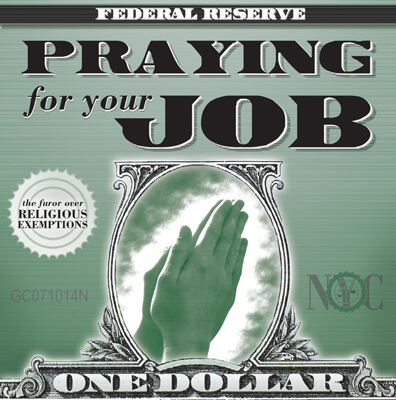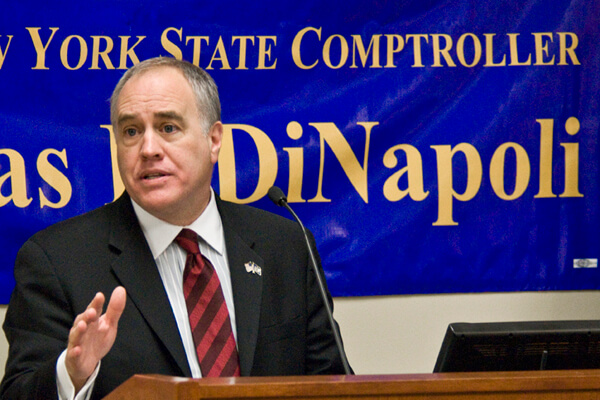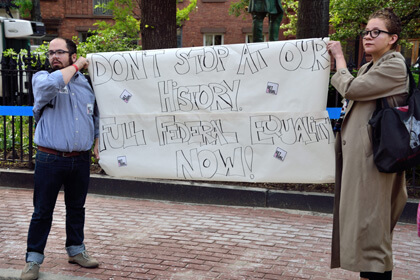BY DUNCAN OSBORNE | A number of constitutional law professors say that President Barack Obama has the authority under federal law to issue an executive order barring discrimination based on sexual orientation and gender identity by companies contracting with the federal government.
“I think he can,” said Richard Ugelow, a law professor at American University in Washington, DC. “The executive order is really a condition of contracting by the federal government. I think it can be done.”
A number of LGBT groups, notably Freedom to Work, have been pressing the Obama administration to amend a 1965 executive order that bars discrimination on the basis of race, color, religion, sex, national origin, disability, or veteran status by federal contractors. The order covers 22 percent of the work force and is enforced by the US Department of Labor.
With power to set federal contractor terms, most but not all agree, president can expand 1965 LBJ action
The White House has said it wants to enact the Employment Non-Discrimination Act (ENDA), which would bar job bias based on sexual orientation and gender identity at employers with 15 or more employees. ENDA passed the Senate last year, but is not expected to get a vote in the Republican-controlled House, despite having 203 sponsors.
Prior to joining American University, Ugelow spent 29 years in the Employment Litigation Section of the Justice Department’s Civil Rights Division and defended the 1965 executive order “four or five times,” he said.
While the 1965 executive order, issued by President Lyndon Johnson, does not define the federal statutes that authorize it, advocates say it relies primarily on Federal Property and Administrative Services Act of 1949, which governs federal contracting. The protected classes defined in the order are drawn from other statutes, such as the Civil Rights Act of 1964. None of those federal statutes mention sexual orientation and gender identity and that is a source of some objections to the proposed addition.
“Seems like another example of Obama doing something without legal authority,” wrote Ilya Shapiro, a senior fellow in Constitutional Studies at the libertarian Cato Institute, in an email. “He can’t just unilaterally make law or amend the Civil Rights Act.”
Asked if the 1949 statute authorized the proposed executive order, Shapiro wrote, “Unless there’s some new provision I’m unaware of, that statute doesn’t have sexual orientation discrimination provisions and the Executive Branch can’t insert them by itself.”
In emails, Kermit Roosevelt, who teaches at the University of Pennsylvania Law School, wrote that “most likely the answer is yes” that Obama could add new classes to the 1965 order, and Stephen I. Vladeck, who also teaches law at American University, wrote, “The short answer is ‘probably.’” Their view is that any president has authority to direct the work of the Executive Branch agencies and that includes making rules governing federal contractors.
“Ever since the Civil Rights Act was enacted, the Executive Branch has had a fair amount of latitude in interpreting its applicability to the federal government, including government contractors,” Vladeck wrote. “Although the Supreme Court has never expressly considered the question, lower courts have upheld, among other things, President Nixon’s amendment of the [1965 executive order] to impose race-based affirmative action requirements on government contractors. Thus, I’m hard-pressed to see why President Obama would lack the authority to add sexual orientation and gender identity to the list of protected classifications.”
The greater issue with the executive order is a political one. If Obama issues such an order now, he risks further inflaming conservative voters who are more likely to turn out in the midterm elections. Republicans are expected to retain control of the House in November and they stand a good chance of taking over the Senate.
“It won’t be until after the 2014 elections,” said Kenneth R. Mayer, the author of the 2001 book “With the Stroke of a Pen: Executive Orders and Presidential Power” and a political science professor at the University of Wisconsin at Madison. “They don’t want to do anything to anger the opposition.”
While an executive order would please LGBT voters that may not be as strong a motivation as issuing an executive order that will send religious conservatives to the polls.
“People who are mad are more likely to mobilize than people who are happy,” Mayer said. He shared the view held by the law professors that the White House could issue such an executive order and that it was supported by the president’s authority to run the Executive Branch.
“The issue here is not whether the president can create new protected classes,” Mayer said. “The argument would be allowing contractors to discriminate on the basis of federal law undermines efficiency and raises costs. Would it work? Possibly.”
If Obama does issue the order, it seems unlikely that any federal contractor would want to contend with what would likely be a backlash resulting from challenging it in federal court. And Ugelow thinks such litigation would not succeed, in any event.
“I think in today’s environment, judicial environment, it would withstand a challenge,” he said.

































